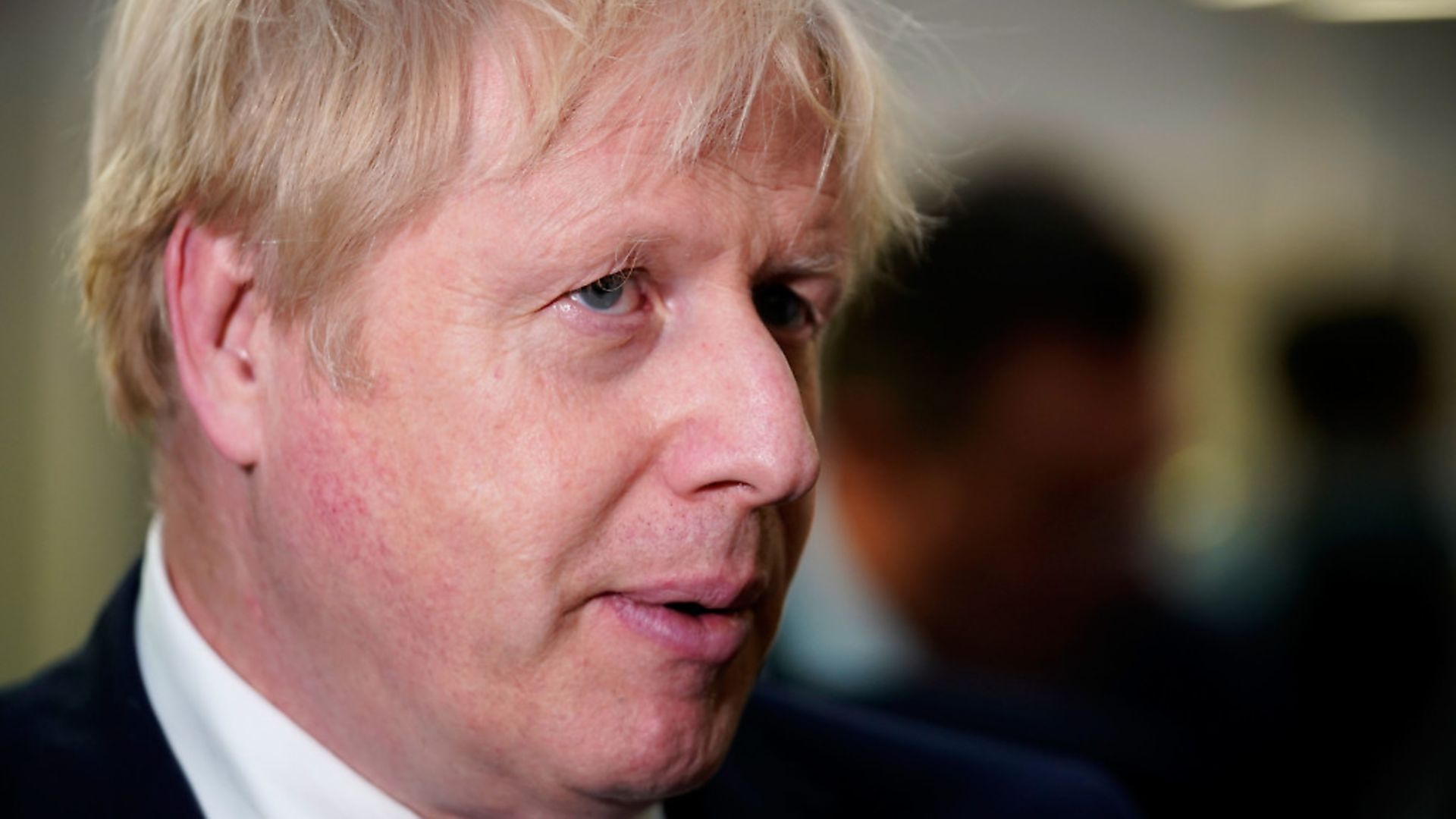
LIZ GERARD on the jaw-dropping contortions being attempted by the prime minister’s supporters in the press
Welcome to the Through the Looking Glass election. To a land that we are sure we have visited before, yet one that seems somehow back-to-front.
Ah yes, of course we’ve been here before. Back in 2016 when we were trying to decide whether to stay in or leave the European Union.
In those days there was this blond chap and our most popular newspapers urging us to venture into a brave new world. Everything was going to be wonderful and we shouldn’t listen to the government when it said that it would lead to disaster. That we’d be worse off, that the country couldn’t afford it, that it was just too risky. We should break free.
Now we are preparing to vote again. But this time, that blond chap and our most popular newspapers are telling us to beware enticements to venture into a brave new world. We should listen to the government when it says it would lead to disaster. We’d be worse off. The country can’t afford it. It’s just too risky. We should stick with what we know.
Having persuaded us last time to break free, the blond and his newspaper groupies are determined to drag us to those sunny uplands, even though they admit there will be more clouds than they envisaged and a lot of us are less sure that we want to go. So the groupies are having to work extra hard to keep us on the bus. And to make sure that the red knave doesn’t get anywhere near the driving seat.
How are they doing this? By using tried and tested tactics.
In 2016, the pro-Brexit newspaper mantra was to accentuate the positive – all the good things that would come from leaving the EU – and eliminate the negative – all those Project Fear predictions to be rubbished.
But when your hero is a renowned liar and womaniser who once discussed having a journalist beaten up, a man under investigation over that 2016 vote, over his relationship with a woman given public money on his recommendation, over his Russian bankrollers, it becomes a little hard to find the positives. Much easier to focus on the negatives on the other side, to create a Magic Grandpa villain out of Jeremy Corbyn, the anti-Semitic Marxist, aka the terrorists’ friend.
So when “Boris” makes an announcement, the initiative is the main point, for his newspaper allies: The headline incorporates positive words like “boom”, and any counter view is restricted to a couple of paragraphs at the end. When “Corbyn” makes an announcement, criticism of the initiative is the main point, the headline incorporates negative words like “doom”, and details of the policy are restricted to a couple of pars at the end.
So far, so obvious. Positioning is also key. Newspaper circulations are in free-fall, but everyone still sees the front pages – in shops, on television reviews, on social media. So we see a lot of Johnson and his agenda on the front pages. That way, broadcasters are drawn into the propaganda campaign. They may note – as Andrew Marr and Nick Robinson have this week – that Johnson is “getting the headlines he wants” – but they are still spreading the message.
Take the Tory costings of Labour’s election promises. Civil servants should not be used for party political purposes. Taxpayers’ money should not be spent on partisan enterprises. These concerns are barely reported, but when the Civil Service refuses to publish these back-of-a-fag-packet figures, we get stories headlined “Labour spending cover-up”.
Inevitably, the numbers are leaked and quoted as gospel by newspaper’s sympathetic to the Tories. The Mail on Sunday’s account had the cost at “£1.2 trillion. That’ll cost every UK household £43,000” – and set the agenda for the weekend political television shows. Marr might challenge the chancellor over “bogus figures and dodgy accounting”, but the ‘trillions’ are out there; the message has got through. When the loudest chorus is singing the same false notes – and the refrain is picked up by supposedly independent broadcasters – people are bound to think “Well, if they’re all saying it, it must be true” or at least “there must be something in it”.
(Incidentally, during the referendum campaign, George Osborne was taken to task by a select committee for claiming that leaving the EU would leave every household £4,300 worse off. In this Looking Glass world, this government has accelerated Project Fear by a factor of ten.)
So much for the front pages, whose main job is not to grab the attention of other media, but to recruit more paying customers. When it comes to the inside pages, editors are reasonably confident of their audience, so it’s more about stiffening their resolve.
Here the emphasis is more on dissing the enemy than promoting the cause. Corbyn thus claims the first double-page spread in the pro-Brexit titles on most days, while Johnson is pushed back.
Then we come to the not-so-subtleties. Most photographs of Corbyn show him with a grumpy face while Johnson is always laughing or doing a V-for-victory sign.
Last week, the Telegraph recorded the prime minister’s visit to Matlock on the first day of the flooding with a front-page picture of him wielding a mop. Five days later, under pressure from opposition leaders, Johnson went to see the devastation in Fishlake, near Doncaster, where he was denounced again and again. No Tory-backing paper published any photographs of these rebuffs, but the Telegraph wrote a leader declaring that it helped no one “if the situation becomes merely another photo opportunity for opposition leaders.”
What is source for the goose is sauce for the gander: Writers and actors attacking Labour over anti-Semitism, are celebrated in a “stars savage Corbyn” page lead. Writers and actors who take a counter view are “luvvies” to be mocked with headlines like “Who’d listen to this lot?”
Shaun Keaveny of the BBC’s 6 Music featured in the Mail with his “foul-mouthed Twitter assault on Boris” – three months after posting the offending tweet. How many Mail readers listen to Keaveny – or have even heard of him? Does the Mail care? All that matters is that it can attack the BBC and promote Johnson in one go.
The “one rule for us, another for them” approach is relentless. Former shadow minister Ian Austin says “don’t vote for Corbyn”, and it is front-page news across the Brexit press, with headlines such as “Vote Boris!” and “The Labour veterans who plead: Vote Tory!” Former Justice Secretary David Gauke says “don’t vote for Johnson”, and it’s a smaller story, inside, headlined “Ex-minister dubbed a traitor”.
When the Greens, Liberal Democrats and nationalists talked about standing down for each other to avoid splitting the Remain vote, it was an “undemocratic unholy alliance” (the Sun), a “grubby pact” (Express). Fair enough, you might think, restricting democratic choice and all that. But what about all those front pages begging Nigel Farage to do the decent thing? The successive stories urging Mail readers to write to the Brexit Party urging them not to stand against the Tories? The “thank you Nigel, but we want more” splashes when he halved the number of candidates?
But then came ‘nothing to see here’, less prominent headlines that followed his allegations that the Tories had tried to bribe some of his candidates to step aside, the news that Lord Falconer had reported these claims to the Met and that it was investigating.
Maybe this was because only Labour goes in for bribery – as in ‘bribing’ students with promises of abolishing tuition fees and families with the promise of free broadband. On the other hand, if, as the Times predicts, the Conservative manifesto promises free childcare, it will undoubtedly be “help for hard-working families”.
The aversion to Corbyn’s Labour party is not merely ideological, there is a commercial imperative, too. For a Corbyn government has threatened another look at Press regulation and ownership, a reopening of the Leveson inquiry.
Newspapers have every right to campaign, to take sides. This very publication does so shamelessly – proudly, indeed. The Daily Mirror is as aggressively anti-Tory as the Brexit papers are anti-Corbyn. But all newspapers ought to offer a clear distinction between fact, comment and conjecture, as required by their regulator, the Independent Press Standards Organisation.
Currently, propagandists in the press are distorting, manipulating and dressing up opinion as news, sure in the knowledge that there is little chance of complaints being considered before polling day and that, even if upheld, any sanction is likely to be mild. What price a page two correction in a few months’ time compared with the twin prizes of keeping Corbyn out of Number 10 and getting the UK out of the EU. That is their Project. Failing is their Fear.
There is a shift in public opinion towards remaining in Europe; Johnson is a divisive figure (and not even most newspapers’ first choice for prime minister). The Conservatives may be miles ahead in the polls, but Johnson is still behind where Theresa May was at this point in the 2017 campaign.
Then, the press thought May was going to win a landslide. Instead she lost her majority. Now, they are terrified of history repeating itself – or worse. This fight is going to get a lot dirtier before it’s done.










